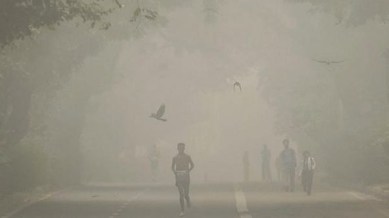Stay updated with the latest - Click here to follow us on Instagram
As Delhi breathes easy, Supreme Court relaxes GRAP curbs from Stage 4 to 2
The Supreme Court also asks the Commission for Air Quality Management to consider incorporating certain stage 3 measures of the Graded Response Action Plan (GRAP) as well.

Taking note of the improved air quality index (AQI) levels in the National Capital, the Supreme Court Thursday allowed the Commission for Air Quality Management (CAQM) to relax the emergency measures in force in the city under Stage IV of the Graded Response Action Plan (GRAP) to Stage II.
A bench of Justices A S Oka and A G Masih also asked CAQM to “consider incorporating certain additional measures which are part of Stage III (of GRAP)”.
monthly limit of free stories.
with an Express account.
It added, “If the Commission finds that AQI goes above 350, as a precautionary measure, Stage III measures will have to be immediately implemented… Also, if AQI crossed 400 on a given day, Stage IV measures will have to be reintroduced.”
Appearing for CAQM, Additional Solicitor General (ASG) Aishwarya Bhati submitted the AQI levels from November 18 till December 4.
The bench said that “up to November 30, the levels were consistently above 300 and it is only during the last four days that the levels had come down below 300”.
It added, “While it is true that at some stage, the court will have to leave it to the commission to decide about the applicability of stages under GRAP, considering the data placed before us… we do not think that it will be appropriate at this stage to allow the commission to go below Stage II.” It added that “perhaps, further monitoring on the part of this court is necessary”.
The court will hear the matter again on December 13.
Submitting data on the AQI levels, Bhati told the court that “there is a clear downward trend, but it is thanks to the meteorological conditions”. She added, “Yesterday, we were out of the GRAP stage also, as per the reading.”
On Wednesday, Delhi had recorded an AQI of 178, in the ‘moderate’ category — 50 days after it had last experienced such air. On Thursday too, Delhi experienced moderate AQI at 165.
The court said, “We can understand you saying that all GRAP Stage IV will not be applicable, but you can’t go straight away out of GRAP.”
Bhati said the CAQM’s recommendation was to “make a hybrid of stages III and IV ” and to permit it to take further call as per the GRAP schedule. The ASG added that “the forecast for the next week suggests that we will not go beyond Stage II”.
Senior advocate Aparajita Singh, the Amicus Curiae in the case, said that the AQI levels had indeed gone down because of the court’s directions to implement GRAP IV measures. “…but the major problem… is implementation and I strongly disagree with the learned ASG that we cannot achieve more than this. There are a lot of things which are just on paper and not being implemented.”
She added that even now, different parts of Delhi had different AQI levels. “For instance, in Mundka, where there is open garbage burning, the AQI is 221. So, while crop burning is one issue, open garbage burning is happening in Delhi itself.”
The court wondered if there is any data about garbage burning in Delhi. To this, the ASG said, “I am instructed that no specific protocol is there.”
Justice Oka replied, “That protocol has to be there. This all happens because the 2016 rules are not being implemented.”
The National Green Tribunal had banned the open burning of waste on land in 2016, including at landfill sites. It had also imposed fines for open burning.